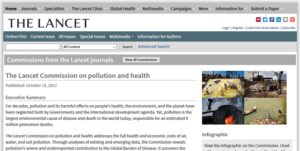The Lancet, one of the world’s leading medical journals, recently published two long commissioned reports, timed to coincide with 23rd Conference of Parties to the UN Framework Convention on Climate Change and the third UN Environment Assembly. The journal’s aim was to boost climate change mitigation and enhance a ‘Pollution-free World’ initiative in the name of public health. This paper gives examples of the biased, misleading and false health-based arguments that are made in these reports.
The main conclusions of the Lancet reports – widely disseminated by the mass media – were as follows:
- that a huge global mortality burden is attributable to industrial pollution
- that a key to gaining health co-benefits of climate change mitigation is to introduce a moratorium on construction of coal-fired power plants
Both conclusions are false. To arrive at them, the authors of both reports have hidden the benefits of the comprehensive institutional environmental health protection action – based on hygiene principles – that helped to eradicate malnutrition from today’s richer nations in the period after the Second World War. The authors of both reports have also, by not quoting (or by misquoting) a game-changing article published in Nature, advanced the false argument that industrial development is to blame for much disease and mortality around the world, and in particular in the developing world.
The Lancet report declared that 9 million deaths each year are attributable to ‘pollution’. However, almost all these deaths are a function of underdevelopment. Pervasive fecal pollution, including animal manure, is the root cause of mass malnutrition among 800 million people, causing repeated bouts of diarrhea that often leave children permanently malnourished or stunted. Malnutrition then makes people especially vulnerable to the detrimental effects of indoor and outdoor air pollution from the domestic burning of wood, other forms of biomass, and coal for heating and cooking. The Lancet pollution report mentions the link, but shamefully fails to deal with the implications.
Neither of the Lancet reports is of much help in putting the vitally important but totally neglected subject of institutional environmental health action on the sustainable development agenda. Although the authors of the pollution report have sought to take the moral high ground by quoting the Pope’s Laudato Si encyclical on the environment, both of the reports are immoral, and gross distortions of public health science and the historical achievements of health protection.
Views: 387


If you believe the crap from the GWPF then I have some coal to sell you.
Oh, wait a minute, that would be Matt Ridley.
Cogently said, Dennis, but what, again, is your argument?
You shoot the messenger once more, for it’s not the GWPF but Professor Paunio, an expert in the field, who wrote the paper. The abstract, as you can see in my post, is hard-hitting. Don’t you believe him?
Sorry, I should have said please explain why you don’t believe him. Also, what do think about both reports being immoral and gross distortions of public health science?